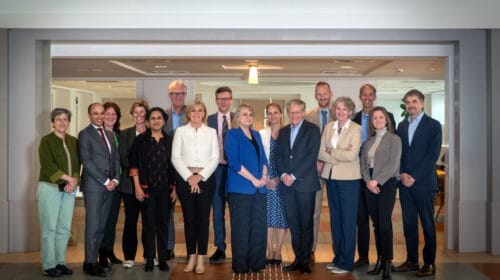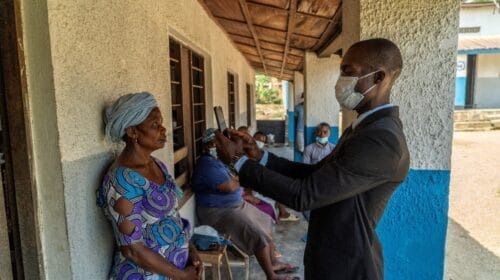You can take photos with your phone and make big money – Mayor Otu, Nigerian photographer

Akwaowo Otu, otherwise known as Mayor Otu, a 2008 graduate of biochemistry, University of Calabar, boldly embraced photography as a profession, and today he has made impact in documentary photography in Nigeria.
He is the author of the book, WE ARE ALL AFRAID: A Beginner’s Guide To Street Photography.
PT: What are other things you are passionate about other than photography?
OTU: I am passionate about evangelism, I am a very spiritual person. I am passionate about non-profit, my photography is actually based on that.
PT: What is that one thing that continually pulls you to photography?
OTU: The impact that one image can actually create. You could just have this frame, a picture, and it could change someone’s life, change a community’s life, change a nation’s life. It is the impact that a picture creates, not really about the glamour. Over time, I have seen my images impact lives, change things for people, get school fees, and school supplies for people, get money for people to start businesses, get water for communities.
PT: One can still do excellently well, make profits from photography as a hobby, while pursuing a career in a complete different field?
OTU: Being a doctor is a profession, being a lawyer is a profession, so photography is a profession. It could be a hobby, but it’s a profession. If I am supposed to go out and be the best in my profession, like medical surgeons are or lawyers, economists, accountants, and the likes, they spent time in the career, they put in years, they put in work. For me, that is the same thing. I want to put in years, and put in work, and put in everything I have into it because I am trying to build a career out of it. Because with a career, you are building a legacy.
PT: Many parents would disapprove of their children taking to photography as a career?
OTU: I have parents that wanted me to get a Ph.D. in biochemistry. The idea of photographers to them were people who go around at event venues, photograph for, maybe, N250 per copy. The idea of photography wasn’t something they could buy into. But my parents are the kind of people that would not want to readily push their ideas to you, they would want to see you do what you want to do, maybe in their mind, they want you to fail so that you would come back to what they wanted you to do.
When I started, it wasn’t like they supported it. They were not (also) against it. To support it means they would have given me money to get cameras and all of that, but they didn’t do that. Turning against it means they would have stopped me from actually trying to photograph. They didn’t do that, too.
But things have greatly changed. Two things happened. Once, my dad’s car got bad and the mechanic called a large amount for its repairs. He (dad) couldn’t do it at that point, he was a civil servant. So, I asked the mechanic how much it cost and his account number. I transferred the money to the person. So he (dad) was like, ‘where did you get the money from?’ I said ‘photography!’ So, for the first time he was like, ‘Is this boy really making this kind of money from photography?’ My dad is an upright person, his interest now was – he wants to be involved to know I was not ripping people off. Immediately he realised I was making genuine money, he was okay.
Then one of his friends in the government told him about my work that I did. The man didn’t know me as my dad’s son, he just knew me as me. When he had that conversation with my dad and how proud he was of me, my dad told him, ‘Yeah, that’s my first son’. That conversation actually changed a lot in his head, the way we (my dad and I) talked about photography changed. More so, I got married from photography money, so he is proud (of me).
PT: There are many people who would have wanted to own a camera, but perhaps got discouraged because of the one on their phone. How does this make you feel?
OTU: I know a lot of phone photographers who are making it as phone photographers. They are not regular guys, they don’t want to buy cameras and all that, they just use the camera on their mobile phone. They are doing good and are getting sponsorship, too. So the point is knowing and harnessing your skills. It is not really about the tools, tools can be hired. People outside Nigeria don’t buy it because it is costly. It is better you rent, do the work, make money, and go away.
PT: For people who wish to learn photography, where should they go to?
OTU: Find someone that is doing it (photography) and learn from the person. If you have internet access, YouTube is the best place. Type in your questions (about photography) on YouTube just like the way you do on Google, you will find answers – people have created videos for it and tutorials.
PT: You post on Twitter, a lot of photos with strong emotions. Have you ever reached that breaking point where you feel like crying during a photoshoot?
OTU: I have had it more times than I can count…. (Laughs) There is a project I did, when I came back people said I looked depressed. It was the story I did about the women living with fibroid. That project changed my life, I would say, because having to hear conversations from these women, the things they are going through. Having to witness the surgery, stay inside the theatre and photograph the surgery, and having to see them wake up after the surgery. It was something very profound for me. It was in Uyo, actually. I see the fight in their eyes.
I don’t photograph anybody I don’t have a conversation with. So, when we have the conversation, people tend to tell you things that break their heart and as a human being, you connect to that. So when I am trying to photograph, what I do is to remind them of what they said to me and have that played back in their head. So immediately the react that is when I photograph. And most of the time I can’t hold my tears. I believe that the strongest images are created at the moment of someone’s vulnerability. And when someone is vulnerable, it is at their breaking point. And as human who has empathy, you will be broken too. Sometimes, the tears come.
PT: Has your camera ever come in between you and your wife?
OTU: No. My wife was my best friend (before we got married). I think she was the very first person I said, back in Uyo then, I would travel Nigeria and I would be photographing. So she understands the dream. And I understand the part that when I am back, I am back. When I come back home after I shoot, I don’t even want to copy the card, she is the one that is always telling me, ‘Hey bring the picture, let me see’.
PT: How tough is the competition out there, for you?
OTU: I don’t see competition. Let me tell you why. Before I moved to Lagos, my works were on exhibition in Abuja. I went to Abuja, people that I have not seen before loved the work. The president’s photographer bought some of the work, he told me I am doing great stuff and that if I actually want to do better I should just move. He told me in October (first week) and by the third week of October, I was in Lagos. That was in 2017.
I knew how to shoot portrait and I was a light assistant at a studio, so I learnt a lot about lighting and doing portraits for music artistes. I used to shoot for music artistes, too. Then I just told myself I don’t enjoy (what I was doing), let me go back to my documentary stuff. When I was shooting artistes, it was only people that knew me that would refer people to me, there were bigger guys in the industry shooting artistes before me. So I went back to shooting documentary. I remember my friends telling me, ‘You have to shoot everything so you could survive.’ I said to them, ‘No, I don’t have to shoot everything; I have to shoot what I know how to shoot.’ I knew I could shoot strong portrait of people on the street like nobody can.
Before long, people started sharing my work (on social media), people started asking ‘Who is this guy?’ So my work was almost everywhere. I shot like two images and they went viral on Instagram. The attention started coming. Most of the people that come to me, they know exactly what they want, that is why most of the times I work with non-profits. With what I am doing, I am not seeing competition.
PT: Let’s talk about the worth of the industry in terms of revenue and employment generation.
OTU: I believe the industry is still young. The industry is large enough to employ a lot of people and there is a lot of money to be made in the industry. The problem is that most people don’t know how to access the funds (available for photography) or because of the fact that most people don’t have the needed skills, so what is happening is that people are averaging at the lowest price.
PT: What’s the biggest amount you’ve ever made in photography in one single project?
OTU: It was $5,000 for one day.
PT: We will like to have you talk briefly about story-telling in photography.
Story-telling in photography, for me, is just your ability to use images to create attention, awareness to a particular cause or actually try to change stereotype with it. It is just like the rudiments of normal story-telling. Your images, as a story-teller, must be simple enough for someone to understand, but yet intriguing enough for them to ask questions.
PT: Do you think the industry has been underrated in Nigeria?
OTU: I think it has because of the fact that people who were successful did not show off. By that I mean when a lawyer wins a case in court, the person celebrates, the family gets to know, and everybody celebrates. The same with a medical doctor that just did a very difficult surgery, everybody celebrates, same with the accountant and the rest of the professionals. But a successful photographer before now didn’t use to show off. And when people don’t have something they can look up to as being successful they actually have to find a way of downplaying its place in society.




